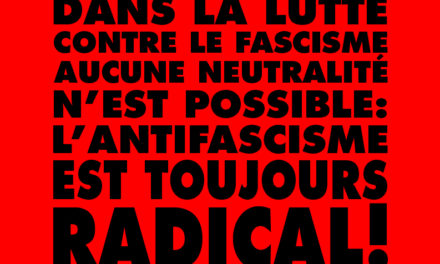Barring unforeseen circumstances, Bill 21 – or, “An Act respecting the laicity of the State” – will be passed by the National Assembly this Friday, June 14, 2019 (correction: the bill will likely be passed over the weekend of June 15-16). We would like to explicitly state our opposition to this bill, which we consider to be discriminatory and a concrete manifestation of the normalization of a certain racist, xenophobic, islamophobic and misogynistic rhetoric that we have observed for many years in the political sphere in Quebec, a rhetoric which favours the rise of far-right groups.
Bill 21 and its implications
This bill has multiple aspects, namely:
- It amends the Quebec Charter of Human Rights and Freedoms to add secularism (or “laicity”) as an overarching value of Quebec society;
- It prohibits public sector employees from wearing any religious symbol. This includes, among others, teachers in the public sector, notaries, commissioners, and lawyers in several fields;
- It prohibits any individual who is giving or receiving a public service from having their face covered – this affects, for example, health care received in a hospital or a CLSC and public transport services;
- It does not affect symbols of “Québec’s cultural heritage” – in other words, the crucifixes at the National Assembly and in courts are spared (it should be noted that the CAQ government was heavily criticized for its hypocrisy on this point, and government officials announced June 6, 2019 that the court crucifixes would be removed following the adoption of the law).
The implications of this bill are many and varied, and some seem very dangerous to us, especially in the current political context. While in theory, the bill covers all religious symbols and all types of face coverings, it is clear that its main targets are people belonging to religious and spiritual minorities, including, for example, Jewish men who wear the yarmulke or Sikhs who wear the turban, as well as people who wear the traditional symbols of the Indigenous nations of this region. That being said, in Quebec’s current socio-political climate, this law will predominantly and particularly affect Muslim women wearing the hijab. Those who wear the niqab will be affected even more intensely, as they are also targeted by the bill’s clauses on services with face uncovered.
On the one hand, the fight against Bill 21 is clearly a feminist struggle. The people most affected – and targeted – by this law will be women, specifically Muslim women. One can easily connect the dots between such a law and other current feminist issues, such as the wave of anti-abortion laws currently sweeping the United States. With Bill 21, we are once again seeing a government taking it upon itself to regulate women’s bodies, this time by determining what they can and cannot wear. While the ranks of the pro-Bill 21 movement do not lack (mostly white, non-Muslim) men who condemn the religious symbols worn by Muslim women for their “oppressive nature toward women,” it must be emphasized that, firstly, these same men so often have misogynistic attitudes and oppressive behaviours toward women in their own movements and interpersonal relationships that we have to wonder how much they truly care about women’s issues and equality when it does not suit their political argument. And, secondly, we note that when speaking with actual Muslim women in this province, most say they choose to wear hijab (or niqab) as part of their personal religious practice. We are against forcing a woman to wear anything, not because we defend religious symbols or face coverings in themselves, but rather to defend the right of women, and of any individual, to choose what they wear.
On the other hand, we also find – in both the actual text of the bill and in its implications – that Bill 21 sets a precedent in terms of legal and systemic discrimination against religious minorities, who, in this case, are often also women and racialized people. These individuals are typically presumed to be immigrants (whether or not they actually are), and the bill and its supporting groups seem to be motivated by a strong xenophobic sentiment (whether or not this is openly acknowledged). Religious minorities are accused – at least implicitly – of not being sufficiently assimilated to the “values” and “culture” of white, francophone and secular-Catholic Quebec society. Following the adoption of Bill 21, the consequences of not being “sufficiently assimilated” could be severe. Once the law is in force, Muslim women wearing niqab will no longer be able to go to the hospital or use public transportation. Many Muslim, Sikh and Jewish teachers will be forced to choose between their faith and their career. Otherwise, they may decide to leave Quebec, an option that many say they are taking into consideration.
Of course, the adoption of such a bill may also encourage xenophobic and Islamophobic far-right groups, and contribute to an increase in hate crimes against religious minorities, immigrants, and racialized people. In short, this bill is dangerous!
The question of secularism
For us, taking a stand against Bill 21 and against the ban on religious symbols does not mean we are opposed to secularism – on the contrary. We fully agree that the state does not have the authority to impose religious beliefs on anyone. That being said, we do not believe that Bill 21 embodies religious neutrality. Any prohibition of religious symbols – including forbidding people from covering their faces for religious reasons – is based on a particular interpretation of these same symbols, which goes against the principle of secularism that states that the state cannot interpret the meaning of religious symbols. In addition, it is important to note that the individuals and groups who support Bill 21 generally do not question the tax benefits enjoyed by most religious organizations or the subsidies available to denominational private schools. In other words, Bill 21 represents a false secularism that contributes to the stigmatization of certain religious and ethnic groups, while carefully preserving the interests of the white Catholic majority, whose institutions and symbols are presented as part of our heritage.
Finally, though the government denies this, it seems clear to us that Bill 21 is only the most recent step in a process that has been accelerating for more than a decade: the redefinition of Quebec identity in a xenophobic and exclusionary way, specifically on the basis of white ethnic identity. This bill profoundly divides our society, portraying non-Christian religions as alien to the nation and to the social body. Thus, Bill 21 has more to do with redefining the national order than with secularism as such, and it can be said without any reservations that this bill has nothing to do with an alleged neutrality of the state.
Biased “public consultations”
In May 2019, the Legault government organized “specific consultations and public hearings” regarding Bill 21 and its implications. We think these consultations were profoundly biased in favour of the adoption of the bill and served only to try to legitimize it and silence its opponents (because, you see, there has been a “democratic process,” and the majority supports the bill).
Particularly, we note the presence of Djemila Benhabib of the Collectif citoyen pour l’égalité et la laïcité early in the hearings. Ms. Benhabib, a former PQ candidate known for her opposition to “Islamic fundamentalism,” is a staunch Islamophobe close to Quebec’s far right. For example, in May 2017, during a symposium she hosted with Mathieu Bock-Côté on freedom of the press, private security was provided by members of the anti-Muslim group La Meute. Several nationalist and identitarian groups, such as the Ligue d’action nationale and the Mouvement national des Québécoises et Québécois, were also present as guest speakers.
This is not to say that voices in opposition to the bill were completely absent from the consultations. The Coalition Inclusion Québec, the Fédération des femmes du Québec and the Ligue des droits et libertés, to name some groups opposed to the bill, were present. However, it is impossible to deny the clear preponderance of pro-PL21 groups and individuals at these hearings. In addition, religious groups – and therefore those directly affected by the bill – were largely denied access to the consultation process. Minister Simon Jolin-Barrette also never seemed truly open to arguments and testimonials that highlighted the negative consequences of the bill. Every time such an argument arose, he shut it down and cut the debate short by invoking the “impatience” of the majority of the population and their support for the bill – using data from a few questionable polls. The entire “consultation” process has thus been a vast farce, as biased as it was superficial.
Our position
Montréal Antifasciste wishes to reiterate its firm position against any discriminatory legislation that stands to have serious, harmful repercussions for marginalized people and communities. We believe that Bill 21 represents an unacceptable attack on the rights of minority religious communities in Quebec, and that it reflects the normalization of a xenophobic, racist, Islamophobic and misogynistic discourse that we have increasingly seen in the Quebec political sphere in recent years. The normalization of such rhetoric encourages the far right, and this can have important and concrete consequences for the safety and well-being of large segments of the population, particularly Muslims, racialized people and immigrants. We also want to emphasize that the CAQ government is not the first or only force responsible for the normalization of xenophobia and Islamophobia in our society, but rather fits into a much larger logic and into more complex ramifications linked to the capitalist, colonial, patriarchal, white supremacist system in which we live.
Therefore, we support the current struggles against the adoption of its bill. More broadly, we will continue to struggle against the rhetoric, ideas and conditions that make it possible and acceptable to enact such legislation. Finally, we wish to express our solidarity and support for all people and groups who will be adversely affected by this law.





